#and conflict resolution. Additionally
Explore tagged Tumblr posts
Text
Relationships in Midlife
Relationships in Midlife: Challenges & Opportunities The midlife years bring many changes, including shifts in relationships that have been established over the years. As we age, our priorities and perspectives change, leading to a reevaluation of our relationships with partners, family members, friends, and colleagues. In this blog, we will talk about the challenges and opportunities that come…

View On WordPress
#a systematic review of longitudinal studies conducted by social scientists revealed that having expansive social networks in midlife is asso#adaptability#allowing individuals to prioritize their own needs without feeling guilty or selfish. There&039;s no rush to enter into a new relationship#allowing their adult children to express their needs#allowing you to approach a new relationship with a better understanding of your needs and expectations.
Effective communication is crucial i#and a commitment to understanding#and a supportive network to navigate the journey of midlife and beyond.
Family Connections
Midlife is a phase that often involves caring for#and access to new and exciting opportunities.
In midlife#and aspirations. Building trust through effective communication strengthens the connection between parents and their adult children#and build new friendships. Self-care becomes a priority#and career advancement. They can provide individuals with a sense of belonging and purpose#and colleagues. In this blog#and companionship. Additionally#and concerns without fear of judgment or rejection. Honesty#and conflict resolution. Additionally#and create new friendships. Quality#and creating lasting memories and traditions#and emotions#and engaging in activities that promote physical and emotional health. Through self-care#and enhanced mental well-being. By actively nurturing these connections#and experiences. Addressing conflicts in a constructive manner#and family dynamics.
Middle adulthood#and fears#and finding companionship and emotional support are all important aspects of this stage of life. By prioritizing personal happiness and buil#and foster deeper levels of understanding. Effective communication also enables couples to make decisions together#and foster understanding and intimacy. By prioritizing healthy communication#and friendships and social circles in midlife. So whether you&039;re navigating your own midlife relationships or are curious about what th#and histories. This can lead to conflicts and tensions if not properly addressed. However#and honesty form the foundation for building trust#and improved immune function.
In conclusion
0 notes
Text
Something that I see a lot is the reasoning that Dream’s motive is unity. That staged finale was about uniting the server against him to bring them together even if he couldn’t be apart of that. And honestly I’m just not sure that’s the case. For starters, in the big moments when he talks about his reasoning he doesn’t mention unity he mentions together, he mentions family, he mentions team.
[from early days]
“We just wanted to have a good, safe, productive team. And when one person has a tyranny over everybody else—that keeps killing them, then you can’t have a team.” [clip]
“Listen, from now on we’re going have a civilization, okay? That lives in harmony and… and there’s no ruler. Not even me—not even anybody.” [clip]
[Punz and Dream planning]
“Always, the goal has just been that—it’s all one united server that everybody follows the same rules, there’s no countries, there’s no—you know, any of this. It’s just… One giant like—family, right?” [clip]
[prison]
“I just wanted to… I just wanted to bring the server together. Have it be a happy family, you know?” [clip]
[finale]
“Once we know everything, we—we’re able to live and everyone can be invincible and everyone can live together and be in harmony and—and not have to worry about death or pain or anything, then it’ll be worth it. The ends justify the means.” [clip]
“I want everyone to able to live and be happy and together… and you’ve—you’ve ruined that—you’ve ruined that yourself. You’re the one who separates everyone!” [clip]
And I know for some people unity and together might seem synonymous, but in this context I don’t think they are. I think it’s important to realize that Dream wanted people to not be divided, he wanted them to be a happy family, but families aren’t always united. They don’t always agree, they aren’t always peaceful, they don’t always have the same goals or agenda or beliefs, but a close family always makes up in the end and when all is said and done, generally gets along and is there for each other.
Additionally, the way I’ve always understood it was that Dream didn’t want peace, he wanted people to do the right thing [clip] and he wanted people to be happy which means that conflicts where people are getting upset opposes that. Dead pets, items not being returned, houses being burnt, people being insulted, and offenders refusing to simply apologize [clip] that tends to cause a conflict without resolution that leaves a lasting divide and unhappiness, which goes against Dream’s goal. But I don’t think he was against violence or wars as a whole, after all those happen at the beginning, when things were still simple. The point was that people stayed as a whole happy or content and as long as no one got too upset it was fine.
To keep people happy and safe, Dream also needed to prevent any one person from holding the power, because they would abuse it and use it against people, which we see happen over and over again. This is one of the reasons why he had a problem with Wilbur’s self appointed presidency, it’s why he kills George early on and takes his stuff when he became op before everyone else, it is why he kills Tubbo’s villagers. He didn’t want anyone to be too overpowered and then use that power to harm others. Dream considered himself the mediator and one to balance out the sides, the one to make sure people had their stuff back when all was said and done, the one to help people get revenge for their dead pet. Yes, he broke the very rules he made, which people love to point out makes him a hypocrite and therefore his gripe with Tommy has no footing, but notice what he says in the finale:
“You break all the rules. Tommy, there wasn’t even that many rules. They were simple things: respect others, don’t destroy things. You broke everything—every rule.” [clip]
“Respect others,” that’s the first thing he mentions, because that’s the most important. That’s the one that Tommy broke that bothered Dream the most. It wasn’t really about the stealing or the killing or griefing, after all George and Sapnap did that too. No, it was the lack of respect he had for the people he hurt that bothered Dream the most. It was that lack of respect which led people to be unhappy even when the war was over and sustaining that divide even after the war, which goes against the civilization Dream strived for.
It’s not about unity, it’s about the opposite of exclusion. It’s about Sapnap and Punz who were both friends with clingy duo, but not able to join L’manberg because they are American. It was the divide and separation. Like Ranboo who because of nations and politics struggled to be friends with both Techno and L’manberg.
Dream didn’t want people to be truly united in a cause nor did he want true peace - the absence of conflict and chaos because you only truly get those by enforcing them through dictatorship and oppression when you force everyone to have the same opinion and obey. But Dream didn’t want to be a tyrant, that’s one of the reasons why he kept handing the power to a king. He wanted everyone to live in harmony by doing the right thing themselves and he thought that if he could keep the server from splitting that they would.
So then, the reason I think he put himself in prison and planned staged finale, wasn’t about uniting the server even if that’s against himself, but because it was the only way he could see a path to be allowed and accepted back into society. That if he served his time in prison maybe they would see him as a person again and think he got better and let him out, which I’ve talked more about [here] and [here].
“Maybe—maybe I’ll be better and then you’ll let me out.” [clip]
He wanted a family. As Tommy points out in the finale: he just wanted to have friends. He didn’t want to ever be alone. So it doesn’t make sense for his goal to be a self sacrificial move to unite everyone against him for the sake of unity, he wanted to bring people together into a happy society again, where they spend the afternoon fishing and playing hide and seek, not wars and executions and politics. But he wanted to be apart of that society and family too, because he didn’t want to be alone. Honestly, he probably wanted to be friends with everyone, but the division was preventing that, the propaganda was preventing that, and so prison became the only option he could see to undo that. To allow him back into the family that he was trying to keep together. That’s what staged finale was about - protection for him and Punz and the opportunity of reconciliation [post]. If he really just wanted unity then he would’ve have been fairly pleased with Doomsday, where most everyone sided against his side. If he wanted the whole server against him, then staged finale was an abysmal success, as he points out to Sam in Daedalus plenty of people like Techno weren’t involved. But of course it was never about unity because that doesn’t make sense, it was about friends, and family, bringing people together so that no one was alone and excluded, forming a simple happy community again…
#dreblr#c!dream#dsmp#dream smp#dsmp analysis#no one does it like c!dream#did someone order an essay?#dishing up lore#dsmp transcripts#dsmpblr#sorry just see this too often in fics and wanted to set the record straight…#this is fine#it’s something I wanted to drill home in my trailer too as I include his motive at the beginning and the end
112 notes
·
View notes
Text
Uttara Phalguni Nakshatra "The Star of Commitments and Marriage"

Uttara Phalguni Nakshatra has significant implications for those born under its influence, especially concerning their relationships. These individuals are believed to encounter karmic lessons that highlight the importance of love amidst various life challenges. The inherent difficulties that arise in relationships often act as catalysts for personal growth and understanding, enabling them to learn the value of patience and compromise. This celestial influence fosters an appreciation for the intricate dynamics that shape personal connections.
Additionally, individuals born under Uttara Phalguni are thought to possess a unique ability to mediate conflicts and facilitate resolutions between partners. Their capacity for understanding different perspectives equips them with the skills needed to navigate the complexities of emotional bonds. As they face the inevitable ups and downs of relationships, they often gain a deeper awareness of themselves and others. This ability to promote communication plays a vital role in nurturing lasting and meaningful connections.
The enduring love that Uttara Phalguni individuals cultivate is, therefore, a testament to their commitment to personal and relational growth. Their journey illustrates that love is not merely a feeling but an active process that requires effort and dedication. By embracing the lessons learned through their relationships, they contribute to creating stable and harmonious partnerships. This capacity to transform challenges into opportunities for deeper intimacy serves as a foundation for both personal fulfillment and enriched relational experiences.
Return to Basic Stories of the 27 Nakshatras Masterpost
#astrology#vedic astrology#Uttara Phalguni#Nakshatra#Leo#Virgo#Leo Traits#Virgo Traits#Nakshatras#Sun Nakshatras#Uttara Phalguni Nakshatra#uttara phalguni description#astrology observations#astrology blog#vedic notes#vedic astro notes#vedic astro observations#astro notes#vedic astrology observations#Uttara Phalguni Notes#uttara phalguni nakshtra#Leo description#Leo Notes#Virgo Description#virgo notes#Commitment#Marriage
36 notes
·
View notes
Note
Analysis for Gus toh ?
Gus Porter, the charismatic illusionist from The Owl House, is a fascinating character whose depth, intellect, and unwavering loyalty contribute significantly to the show’s dynamic. However, despite his remarkable abilities and compelling backstory, his character arc often feels underdeveloped compared to others. While Gus has his moments of growth, much of his untapped potential remains a tantalizing "what if?" within the series.
A Promising Start: Gus’s Early Development
From the beginning, Gus is established as a prodigious illusionist, gifted far beyond his years. As the youngest member of the main cast, his intelligence and enthusiasm make him stand out. He becomes president of the Human Appreciation Society at Hexside, showcasing both his intellectual curiosity and leadership qualities. This trait suggests that Gus is not just a sidekick, but someone capable of significant influence in the story.
One of Gus’s defining moments early on is his ability to see the value in humans despite their lack of magic, a perspective unique among witches. His fascination with Earth signals a larger theme of bridging gaps between worlds—a theme that, unfortunately, never reaches its full potential with him at the forefront. His ability to humanize both the demon realm and the human world could have played a much stronger role in the show’s resolution.
An Underrated Powerhouse
Gus’s illusion magic is, without question, one of the most creative abilities in The Owl House. Unlike conventional magic users who rely on elemental forces, Gus’s illusions are powerful weapons of deception, allowing him to manipulate perception and even distort reality. When he fully unleashes his skills—such as in Labyrinth Runners, where he strategically uses illusions to outmaneuver his opponents—it becomes clear that he is one of the most capable young witches at Hexside.
Yet, his abilities often serve as plot devices rather than receiving sustained focus. In moments where Gus shines, such as tricking Belos’s soldiers or generating overwhelming illusions, his magic is shown to be incredibly effective, but he rarely gets the same dramatic weight as Luz, Amity, or even Hunter. His growth could have been explored further in battles, political conflicts, or deeper emotional struggles.
Emotional Depth That Deserved More Attention
While Gus is frequently presented as lighthearted and optimistic, glimpses of his emotional complexity occasionally shine through. His struggle with feeling undervalued, particularly as a younger student among older peers, provides meaningful depth. His insecurities about being dismissed as “just a kid” lead him to moments of reckless experimentation, but these themes are seldom explored in great detail.
In Labyrinth Runners, he displays a vulnerability we rarely see—losing control of his own illusions and becoming trapped in a mental maze of his own creation. This is arguably one of the most compelling character moments for Gus, yet the show moves past it quickly, failing to deeply explore his trauma or potential ramifications. Had the series delved further into his psychological struggles with illusion magic—perhaps even addressing its dangers in a broader way—Gus could have been given a more robust arc.
The Missed Opportunities
One of the most frustrating aspects of Gus’s character is how much potential he had in the story’s larger conflicts. As a master illusionist, he could have played a critical role in outwitting Emperor Belos. His ability to deceive and create elaborate visions could have been pivotal in battles, espionage, or exposing lies. Yet, much of his involvement remains secondary to the main plot rather than integral to it.
Additionally, his passion for human studies could have been a driving force in uniting the two realms more meaningfully. While The Owl House explores human-demon relationships through Luz and Camila, Gus’s perspective as a scholar of humanity could have led to major diplomatic shifts or even a resolution that actively included Earth and its inhabitants more directly.
#the owl house#toh#the owl house critical#the owl house criticism#the owl house critical critical#toh critical#toh critical critical#toh criticism#gus porter#toh gus#gus toh#the owl house gus
22 notes
·
View notes
Note
HO 🎄HO ☃️ HO 🎁 it's your Secret Santa in town🎅🤶🔔🎶 coming down your chimney with questions about your MC ⬇️⬇️⬇️
I'm so excited to learn more about Alyn! I just got started on one of your fics but I'm dying to know what the dynamics are between Alyn and Ominis?? What do they do when they spend time together? Who's the more affectionate one? Do they argue a lot? Who apologizes first? I would love to know if you don't mind sharing ❤️❤️❤️❤️❤️❤️
Hellooo! Thank you for reading 🥹💖 and for the questions, Santa! 💖✨ HERE COMES THE BIG POST! ~800 words👇🏻
To not make it extremely big I marked with * places where there are some extra headcanons behind the statement and I can elaborate additionally if needed.
Amberlyn x Ominis
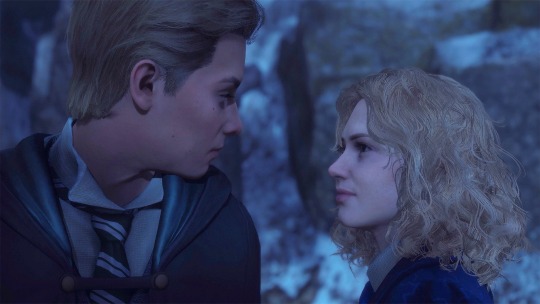
⋆˚⋆⌜ Dynamics ⌟⋆˚⋆
The only one who'd understand. Recognition of each other's complexities. Mutual respect. Quiet support. Nevertheless, push and pull of varying intensity. Something from their Pinterest board:
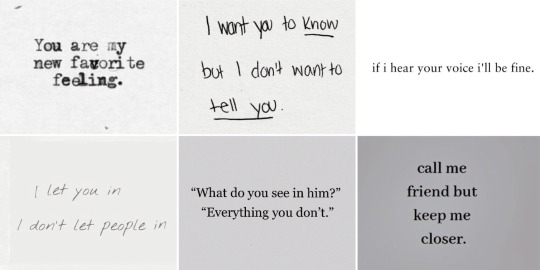
Their bond unfolds slowly, built on trust (since Scriptorium, Alyn always sided with Ominis*) and, much later, subtle expressions of affection. They find common ground in shared struggles (family issues among them*) and the guilt and grief lingering after the events of the fifth year.
Alyn has a knack for finding the right words to soften Ominis' sharp edges and gently coax him into vulnerability. Though both are reserved in their own ways, they provide each other a sense of safety and understanding. (exceptions in Conflicts below)
Alyn is more open with affection—small, casual touches like brushing her hand against his (or her knee against his, because yes, she would; she’s, lost, traumatised and overcaffeinated teen). She completes his notes sometimes, drawing schemes from the board for him, describes things that catch her attention in and out of the class—all this happens naturally and easily.
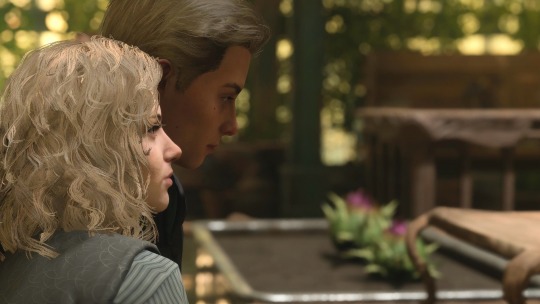
Ominis is more reserved but deeply enjoys her presence and is grateful for her small gestures of help and appreciation. At first, he starts to subconsciously lean just a little closer than necessary during conversations. Over months time, he becomes braver about returning her gestures—a hand brushing hers deliberately, his voice softens noticeably when he speaks to her.
⋆˚⋆⌜ Time together ⌟⋆˚⋆
✨Studying: Since around the end of the fifth year, they often sit together at classes, at the library, or meet in common areas of the castle. Ominis becomes attuned to Alyn's steps, her scent, her presence. He’s startled to realise one day the sound of her voice reading aloud calms him.
✨Spells and Dueling Practice: Ominis’ magic is powerful, and his wand never misses. Alyn learns new spells quickly, and is excellent in explaining. Their training sessions are focused yet competitive and somewhat playful, filled with mutual encouragement and a bit of teasing. Alyn would brush the dust from a shattered dummy off his shoulder, and Ominis, whether he admitted it or not, would think that if the entire castle crumbled into dust around him, he wouldn’t mind—as long as it meant she’d be this close again, brushing it away with her hand.
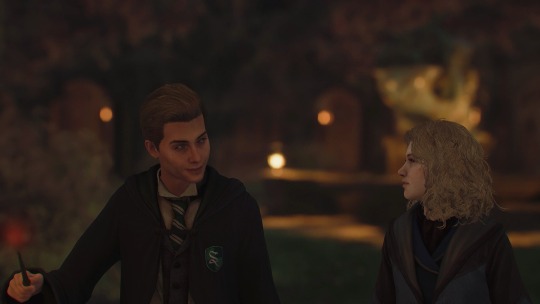
✨Walks: Both enjoy long walks through the castle or by Black Lake. In the sixth year, they always visit Hogsmeade together. Sometimes they are just walking or sitting in silence. They don't normally talk in big emotional outbursts but instead share small, meaningful pieces of themselves over time.
⋆˚⋆⌜ Conflicts ⌟⋆˚⋆
They feel connection because they understand each other’s pain and offer emotional safety, but that very depth makes them vulnerable to fear, mistakes, and misunderstandings.
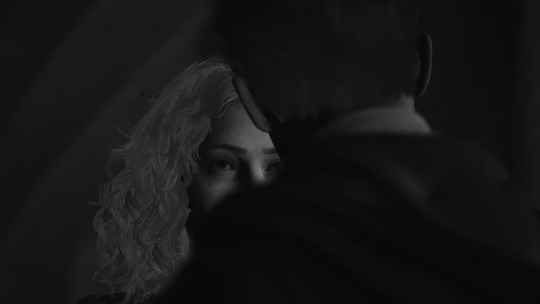
⚡️Curiosity vs protectiveness: Alyn is still new to the magical world. It makes her eager to learn everything—seemingly dangerous or not—out of wonder, fascination, and a desire to understand and catch up. Ominis, however, sees such curiosity as naivety and feels an urge to protect her, especially from anything risky. Alyn grows frustrated when she feels he’s infantilising her.
✨ Resolution: Alyn may prove her curiosity is tempered by caution, reassuring Ominis that she won’t put herself recklessly in harm’s way. Ominis, in turn, may learn to trust her judgment while remaining a protective figure she can rely on.
⚡️Miscommunication: Both Ominis and Alyn struggle with communication. Ominis often needs time alone to process his thoughts, but Alyn interprets his silence as distance or blame and tries to pull him out of it. If she doesn't succeed, she can rapidly go to 'Oh, it's now me not talking to you.'
✨ Resolution: They need to compromise—Alyn has to learns to give Ominis the time he needs, trusting that he will come back to her. Ominis, in turn, has to learn to communicate when he needs space instead of leaving her guessing.
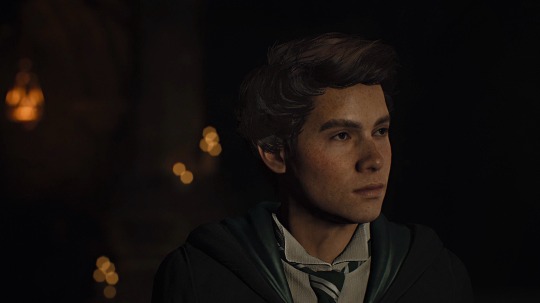
⚡️SeBaStIaN isn’t even at school during their sixth year. But, whenever he’s brought up, Ominis subtly redirects or shuts the topic down, even though he's not as mad at him as he used to be and still considers him a friend. Among other feelings, Ominis is unsettled by the thought of Alyn reconnecting with Sebastian and leaving him behind. Again. His worry isn’t just jealousy (though it is that too). He fears Sebastian might pull her into something dark and dangerous. Again.
Ominis might: a) Withdraw—not to punish Alyn, but to protect himself emotionally. b) Overcompensate—offer her small gestures of affection, lingering touches, or closeness during homework sessions as a subconscious reassurance of their bond. c) Act stupid and say something he'll regret.
Alyn, in turn, gets irritated by his lack of trust, and such an attack on her judgment.
✨ Resolution: Alyn may reassure Ominis that she was never anything more than friends with Sebastian, and that she’s not under anyone’s influence. Ominis needs to learn to differentiate between jealousy and genuine worry and to communicate his fears in a healthier way.
⋆˚⋆⌜ Apologies ⌟⋆˚⋆
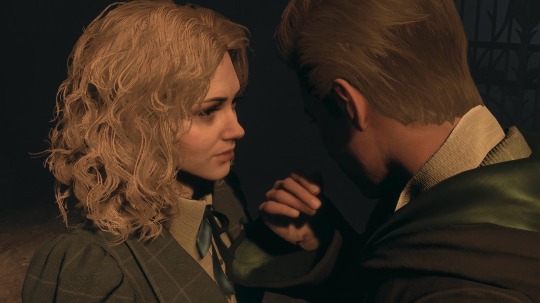
Ominis apologises after angry outbursts, guilt-ridden over losing control—something he fears makes him like his family. His apologies are slow and a bit awkward but deeply sincere. Alyn, on the other hand, apologises gently when she feels she’s misunderstood his intentions or pushed too hard.
Some of these 👆🏻bring them to this 👇🏻
⋆ Christmas 1891 ⋆
...and the aftermath. The second half of the sixth year.
Extra overcompensating for his insecurities while being not entirely sober, Ominis actually kissed Alyn. It happened after an argument following the Christmas party, but as Christmas magic would have it, that time both sides felt heard and satisfied. Eventually, they found themselves sitting together on the windowsill, sharing a quiet conversation. Aaand the first kiss happened.
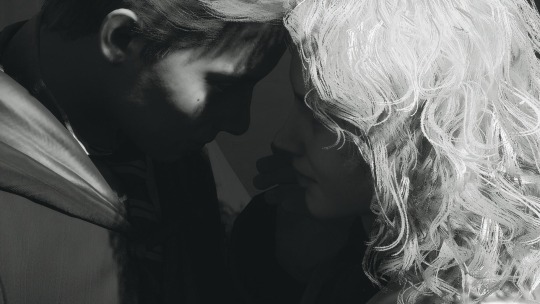
Afterwards, Ominis apologised so many times they almost had another argument. Alyn reassured him that he didn’t need to apologise—that she didn’t mind them trying this new relationship. But of course, they have to make sure no one finds out.
And here the 'Shades' story begins
[ Thank you for reading all this! Now the little side note and rambling (sobbing on the floor) I don't think I actually succeeded at writing their friends to lovers trope in 'Darkness' I wasn't ever even going to post it and it shows. Well, anyway, I figured I'm rather more interested in writing adventure/action and seasoning it with romance than the other way around. That's what I'm trying to do better in 'Shades'. At the same time, now I have clearer understanding of how to deepen and write their relationship and again, it will all be covered in 'Shades' . You are very welcome to read 🤍]
#barely proofread pls if english is not englishing I'm so sorry#I literally don't have time for anything this month *screams*#should have done such post a while ago#thank you santa for questions#hear me out don't judge me by the 'darkness' story if you ever even saw it 🥲#they also kinda have a ship name#I'm just not sure if I prefer this short form or the full one so I used the full for title to be clear#another side note - mostly peaceful and calm because they were trying to survive after the last year#but now the adventures are back#MORE DRAMA#is coming#omilyn#amberlyn x ominis#hogwarts legacy mc#couple dynamics and some lore#hogwarts legacy#HL secret Santa
51 notes
·
View notes
Text
keep up the thamepo [episode 4]
good Lord, so many things are unfolding in this episode! it was quite an overwhelming watch for me, to be honest. i didn't expect the story to change its pacing for the first three parts of the episode. it was a pleasant, surprise! and I believe it was intentional because it had to do with dylan's 'fire'. it's so well done!
therefore, aside from addressing the symbolism of dylan's fire as the rage that affected the pacing of the early parts, I also want to delve into the relationship between thame and dylan and the physical distance (but growing emotional connection) between thame and po. additionally, I want to address the potential parallels between ep 4 jun/po and the possible ep of jun/po because something's going to happen and it won't be as pretty. also, other thoughts will come to mind as I'm writing this post xD
1. dylan as the fire; thame as his water — easily sparked, easily distinguished
dylan is such an interesting character to me because his rage is rooted in his feeling of betrayal for thame. i didn't see much dylan and thame in the official trailer, thus I was unsure how their story would unfold. but it's so crazy to me how thamepo is showing us these perspectives—like I mentioned in (all of) my posts—from every character, not just one. they serve as reliable narrators, providing insights into their emotional turmoil and the intentions behind their decisions.
it's a dylan-centred episode and i was honestly overwhelmed with how fast the first three parts of the story went. not putting it negatively, but i was used to the slow and languid pacing of the last three episodes, so this one felt like a hardcore punch in the face.
i wondered why it was constructed this way—because it wasn't rushed at all—it was just happening too quickly—like a spark of fire.
oh.
dylan is the fire.
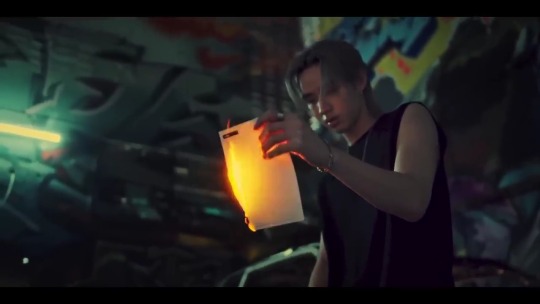
that's why this episode felt like I was on fire while watching it. it burned and hurt and dissolved so quickly and I was shell-shocked at how well they incorporated this motif into the story, blending it with remnants of dylan's anger toward thame and the resolution of their conflict. it's so beautifully done. (I don't know, probably it's the lit side of me that regards this as something so groundbreaking because I don't really see that much infusion of symbolism/motifs in a story this seamlessly. I'm so proud. i adore p'mui and her team even more now T_T they know what they're doing really.)
however, i do feel like dylan's story could be explored just a little bit more. to me, jun's storyline was perfectly told, seasoned with the right amount of ingredients that made us resent, understand and root for him. yet, dylan's story feels more like on the surface level to me, even though his story has so many interesting points to talk about—social commentaries on idols vs artists, the industry's demands for in-trend music instead of authenticity, and the company's ability to stun an artist's growth.
i was hoping they would show snippets of dylan rapping to his songs or joining these underground rapping competitions and comparing his experiences doing these as a solo rapper and an idol rapper. i think these scenes could contribute to a better understanding of the origin of dylan's passion for rapping and producing, as well as unveiling the 'undiscovered' sides of idols/idol rappers in the underground scene—also the spark of betrayal that began because of his crushed dreams and witnessing his best friend 'ruining' everything they built together.
it's just me... but i really wanted dylan's story to be stretched just a bit more because it's not strongly tied to thame the way jun's story did. but I still respect p'mui's decision to tell dylan's story in this manner.
i love thame's persistence in wanting to bring dylan back first before nano because dylan is indeed very important to the group.
i think these two are the producers in the group (along with pepper), but they shared a deeper bond because dylan was difficult to approach, but thame befriended him anyway. (why are they reminding me of namjoon and yoongi T_T)
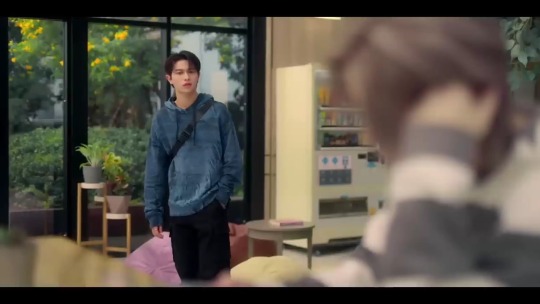
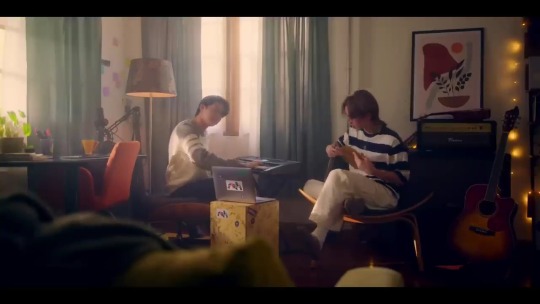
i love this found-family trope in thamepo, and every time they showed us how thame found the members—found the real them—my heart swelled.
and thame saw dylan's potential. he saw how enthusiastic dylan was in writing and producing. he saw dylan as an artist—an art—that should be appreciated. and it's so beautiful. :(
as mentioned before, the members loved thame as much as thame loved them. it's so obvious. the reason behind the drift between them was miscommunication, wrong/rushed decisions and the company's intervention and ability to twist the narrative to their liking. perhaps, all of these could be solved if thame and the members talked it down, but it's easier said than done. so I understand why the strain in the group happened/appeared. it's not easy to let down our egos, but I'm thankful that (with the help of po) thame could finally breach the line between him and the members, hence reviving the group before they crumbled.
moreover, i love how thame effortlessly switches his elements to suit the members' elements. jun was like the wind to me, and thame became the earth that kept him from flying away. dylan was fire, and thame became the water that distinguished his fire with sincerity and another promise that wouldn't be broken. (i have a feeling nano is the water, and thame might be the fire that boils his love and passion to be in the group again, to work together and reach for their dreams—as promised.)
2. physical distance, emotional connection- it makes thamepo's heart grow fonder
ok... so... the thing that's going on between thame and po is CRAZY.
again, i'm so surprised that the scene happened so early into the episode. i thought it would be around the middle (because from my observation, the intimacy of thame and po's exchange would only escalate towards the middle or end of an episode). but they were hitting us as hard as this in the first part and I was honestly struggling to breathe.
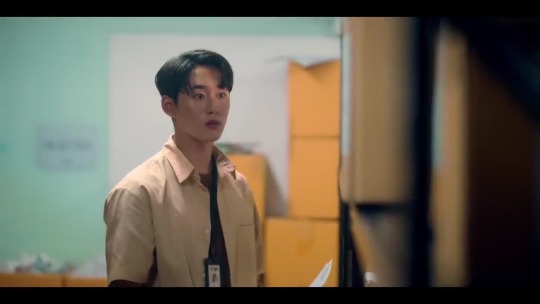
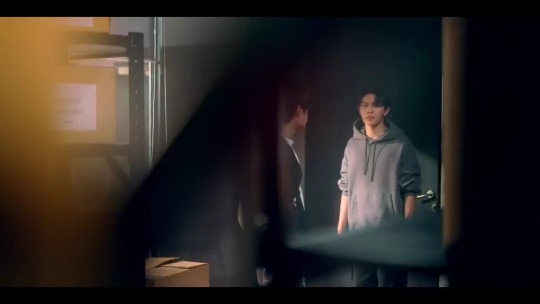
i LOVE these shots. it's so intimately captured. po was looking at thame from the spaces, and thame's focus was instantly on po once he saw him in the storage room.
there was a respectable distance between them (probably because of jun's presence in the room). i think it sets a foreground for us in future episodes, especially after they're already in a relationship: in the eyes of the public, there should be this distance—this five-metre distance—so that they could be accepted—so that they could exist without hurting each other.
and when p'mick came, they were 'forced' to hide and huddle so close to each other. this was when everything was unveiled, the rapid beating of their hearts, the golden light raining against their bodies, the yearning stares, the confusion, the hesitance, the answer, the need.
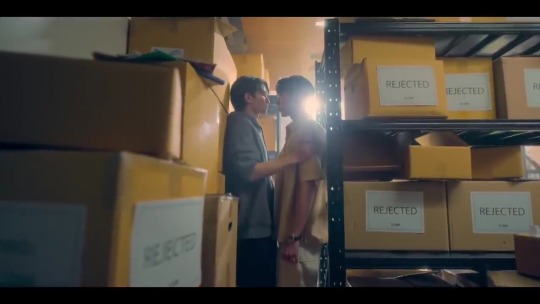
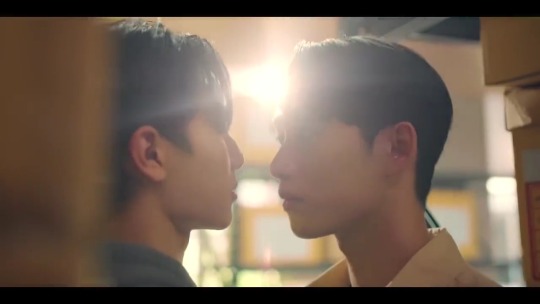
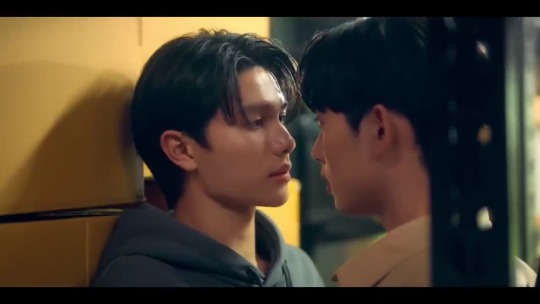
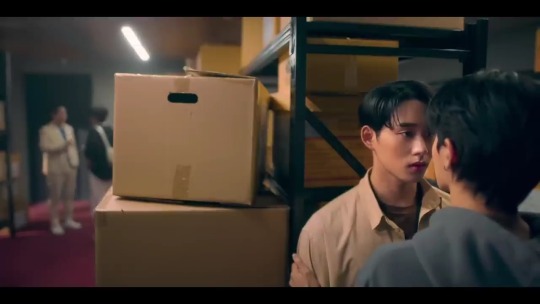
i personally love the idea that thame and po were in the moment, but the world was still revolving around them. p'mick and jun were still talking in the background, but thame and po were spiralling in this juncture of intimacy, of connection, of understanding their feelings and making no sense of everything they were experiencing—the oh moment.
because i think scenes like these are often a form of hyperbole: time stops when I look at him/her. the construction of similar scenes would often go the route of slow-mo or focus shots to emphasise the weight/message of the scene. to me, it's always overly done (and I find it a bit cliche... I'm sorry for saying this T_T). but this scene doesn't feel cringy to me. it's really subtle and sweet and purposeful.
but their moment ended too quickly.
again, the fire symbolism not only reflected thame/dylan's dynamic in this episode but also thame/po. (and I find this so CRAZILY WELL DONE!!!)
however, something about fire with po... i don't think they go well together because...
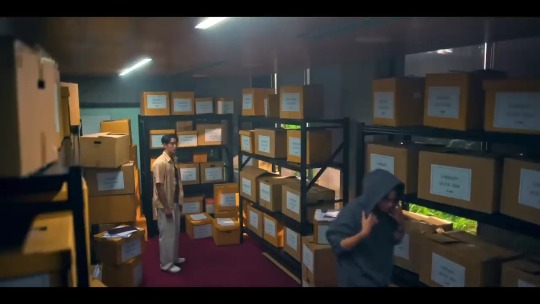
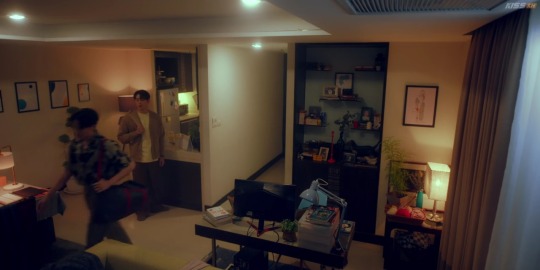
i think, po was all elements for earn's fire. earn wanted to build a career. he wanted to be successful. he was a blazing fire. and po changed himself according to everything earn needed, complimenting earn when he was indeed of something.
but this fire left him. this fire betrayed him. this fire destroyed him.
thame is all elements for MARS, too.
but when it's po and thame, who are they and what they'll become?
throughout the episode, we didn't get much of thamepo, not until the conflict between thame and dylan was resolved.
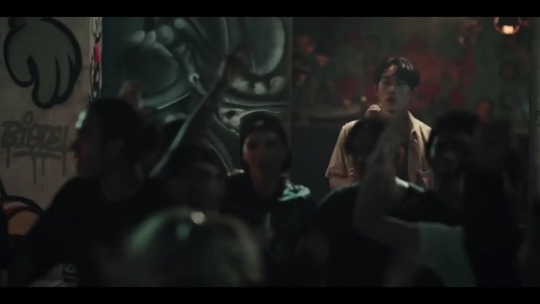
in my opinion, po is really the best partner for thame (and honestly, everyone) because of his diligence, patience, kindness and warmth. he's willing to search for the lyrics, going through boxes, and piecing the shredded lyrics together just to give it to thame—just to help him reach his goals.
he did all that to earn, too.
the shot above broke my heart because po felt the physical distance between them. he was already thinking about the conversation he shared with jun. he was already doubting himself. he was already self-destructing.
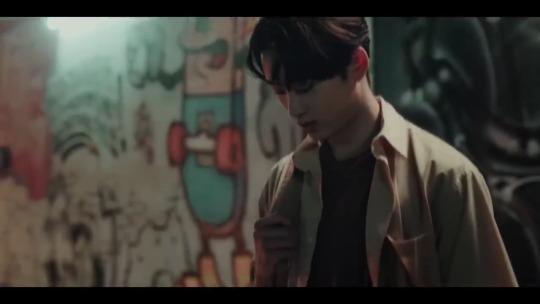
when he saw thame and dylan on stage, smiling, he was happy. he was glad and relieved that thame was okay and he achieved his goal of reuniting with his teammates. however, at this point, po might have thought that, oh, I was used again.
but we know it was never thame's intention to make po feel so helpless and worthless. thame knew what po's ex did to him. the emotional trauma/distress po's experienced couldn't easily be discarded. we can see some moments where po just stared into space. his anxiousness of always checking on his messages. po overthinks everything, already making scenarios in his head of the worst-case what-ifs.
earn took so much of po that po was still trying to find himself again—still wishing that the world would treat him better.
without po realising it, he was already emotionally depending on thame. because thame saw him. thame appreciated him. thame made him feel like he was po again, not earn's shadow, not a nobody.
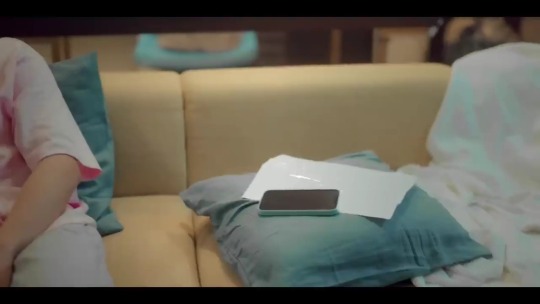
but thame didn't reply to his message. thame didn't come to him afterwards. so po thought it was just in his head. it was impossible for thame to see him. everything thame said to po was—perhaps—only because of the spark of the moment.
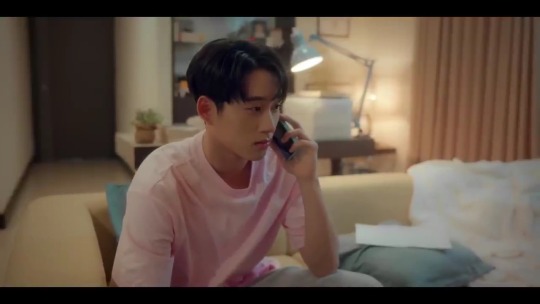
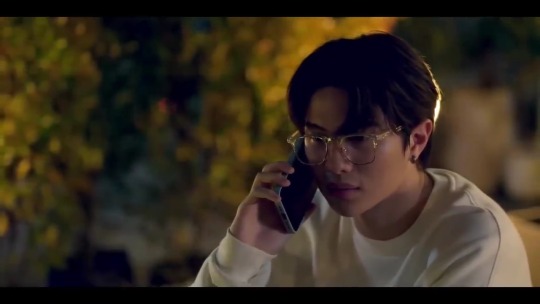
but i'm thankful that thame called po before he could destroy the last ray of hope in him.
the conversations they shared were so heartfelt. even though they didn't meet the whole day, thame knew everything po was experiencing. he knew po was overthinking. and that, to me, is a sign of devotion. and it made me realise that thame and po were emotionally closer, emotionally connected, closer than their bodies could ever be.
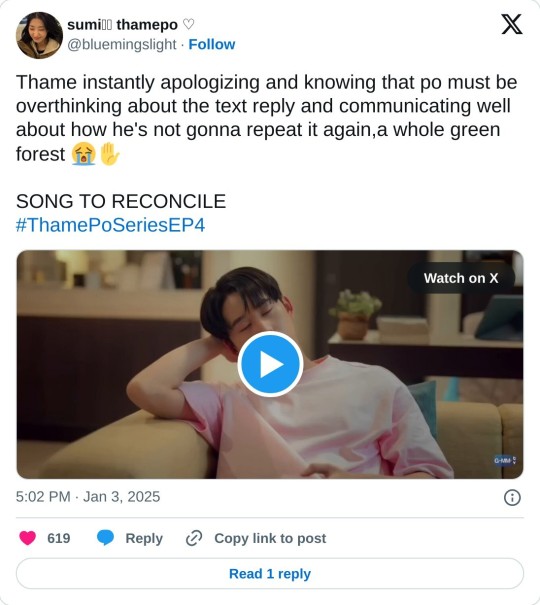
thame apologised. he helped po regain his self-worth. he assured po that he would always be here. he would always feel for po. he would always care for po.
and po learned a lot about thame—he was closer to his dogs than his parents. he loves reading. he loves writing his thoughts down. everything so small and insignificant to others, but meant the whole universe for po.
and they became each other's safe zones.
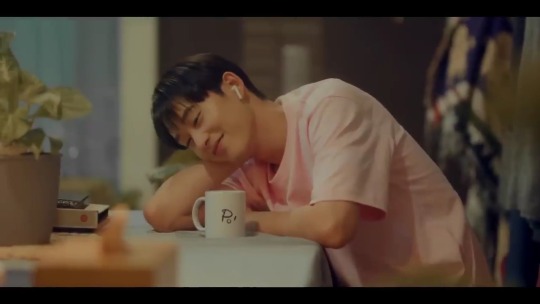
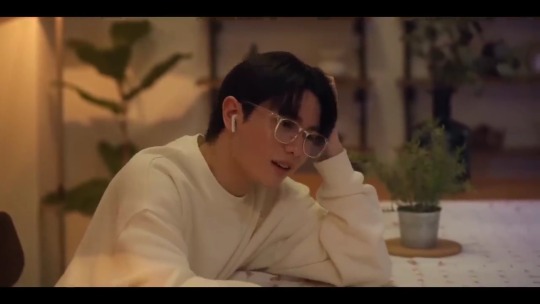
i'm so sorry, but i relate to po in so many ways. i see myself in him the most (throughout all of my years of watching dramas). so I might be biased and root for him the most... and when he feels the most pain, I feel it too :( and when he's so happy talking to thame, I was over the moon. //i'm happy for thame, too. finally, he could give his neverending love to someone who needs that genuine devotion. thank you, thame :((//
and they were on call for nine hours??? and thame waited for po to wake up so that he could serenade his soon-to-be lover with his favourite song??? romance is restored! the slow burn is slow burning!
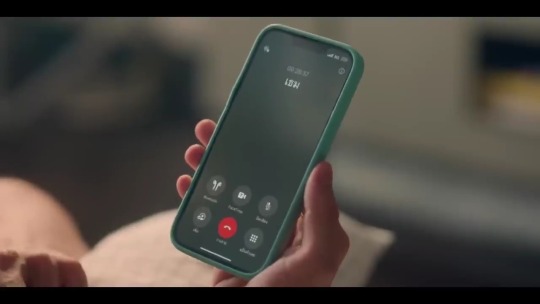
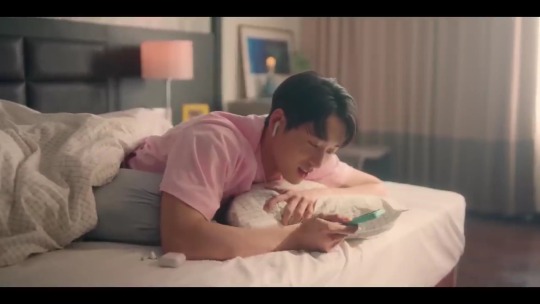
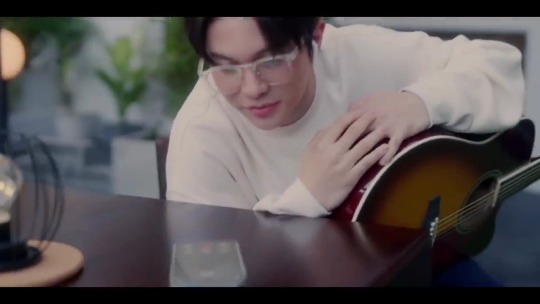
//this scene is too sweet that ants are starting to swarm the screen...//
3. potential parallels (aka upcoming heartbreaks) and nano/pepper's story arc
ok, so this is something that i couldn't stop thinking about after I watched the episode.
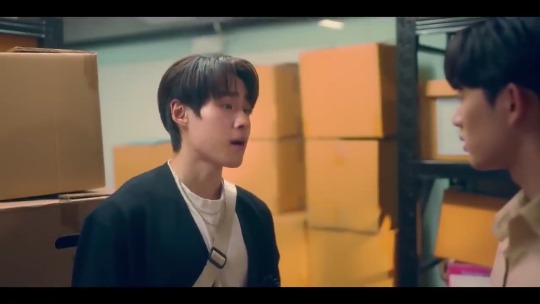
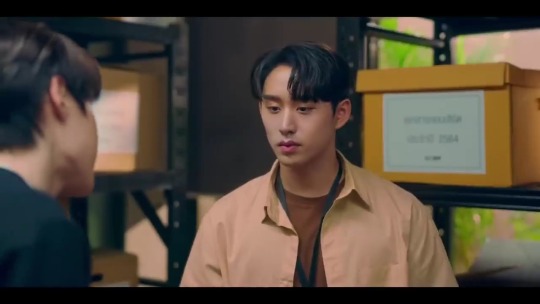
jun saw po. he saw right through po the way he saw straight through thame.
he knew po liked thame. i think he had an inkling that thame liked po too.
however, everything he said to po here was hurtful.
it reminded me of his story arc in ep 3. he was bad-mouthing thame, but it was for thame's benefit—it was his way of showing he cared.
i would like to indulge in the idea that jun cared about po too because he was the only one who knew thame's true intention behind everything he did, and who was helping (or enabling) it in the first place. he knew po was special to thame. but...
the nature of being an idol, i think jun knew it too well. he didn't want either thame or po to suffer in the future. because it'll be difficult to navigate their feelings, to hide their relationship, to behave like they don't mean anything when they're in public. i guess, jun was giving po a head's up, telling po that he wasn't thame's type, crushing po's fantasy of having something different with thame—not in a condescending manner—but rather i don't want you to fall too deeply. there's still a chance for you to move on from this.
but of course, they end up falling.
and this is the price they shall pay.


nano's storyline will be interesting because he's the youngest in the group—the maknae. usually, from my observation, the maknaes love their big brothers/sisters the most. they want nothing but the best for them. and they're willing to sacrifice themselves for them. they felt the most pain when their brothers/sisters experienced anything difficult, and vice versa. (I'm sorry if it's wrong... but this is what I gathered as a k-pop fan for more than ten years hehe...)
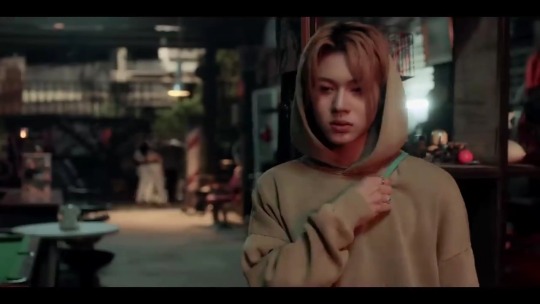
it's heartbreaking to see nano behaving this way. i think he was certain that the members didn't need him anymore. MARS was better as a four-membered group. he wasn't important to them how they were important to him.
but... we know that's not the case.
i'm so excited to see how nano found love and purpose in thame. we saw how important thame was to jun and dylan, so seeing it from nano's perspective will definitely serve as a treat (and more pain).
and pepper's story arc... oh God. i have a feeling he's the easiest to return to the group because he holds no grudges. he understands thame and sees the decisions he made were for the group. he's the mediator and also the connector of the group, and potentially thame's relationship advisor.
however... i think pepper's story arc will be the turning point in this story, the conflict, a reflection of thamepo's relationship in the future.


in the trailer, they held a press con and pepper was sitting in the middle. i think he would be involved in a gossip that might affect the group's reputation. but at that point, they'd already reunited, so all members were present to support him. AND ALSO, it was when thame kissed po in the storage room (?) so yes... so excited to see how pepper's story will unfold.
ok, before i end this post, i also want to add...
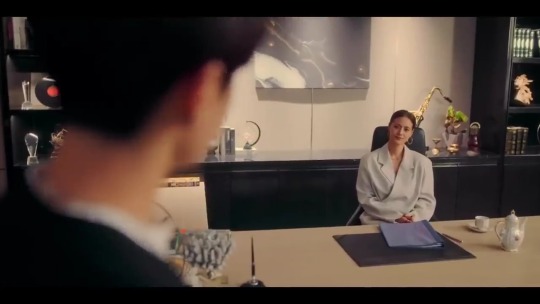
i think khun pemika knows that thame (and MARS/po) are plotting something behind her back because it's impossible for a company's CEO not to know what her artists are doing? she has many observers... it's not possible for another betrayal arc initiated from the people closest to MARS/po in the upcoming episodes...
#thamepo#thamepo series#thamepo the series#thame po heart that skips a beat#thamepo heart that skips a beat#heart that skips a beat#thame x po#po x thame#thame thima#po pawat#dylan#jun#pepper#nano#MARS#william jakrapatr#est supha#nut supanut#hong pichetpong#tui chayatorn#lego rapeepong#lykn#williamest#estwilliam#lyknest#discussion#analysis#meta post#i'm sorry for this mess...#and sorry for the grammatical errors and everything
49 notes
·
View notes
Text
I'm actually not super into vampires which is wht I outsourced this write-up, so shoutouts to my wonderful partner for doing it for me :)
Genre: Post apocalypse fantasy
What is this game?:
Bloodbeam Badlands is a unique rules-lite TTRPG that seeks to tell heroic stories about magical badass sharpshooting vampires and wild desperate adventures in an over the top strange and deadly post apocalyptic wasteland that shines a new light on mythical fantasy by combining magical creatures from folklore and pop culture with the tropes of post-apocalyptic survival.
How's the gameplay?:
The gameplay is loose, basic and imposed checks are rolled during times of drama and conflict to decide outcomes, which means mechanics are usually most relevant in fights. You roll a number of d6 equal to one of your 3 stats (Guts, Guile, and Guise) and compare the lowest die result to one of your 3 sources, which are similar to stats (Blood, Bullets, and Burn), if the result is lower, you succeed.
This simple conflict resolution method is made more engaging with a few inclusions: first of all, your sources are fluctuating, you can lower or “spend” a source to automatically succeed on a roll, the sources can also be lowered as a consequence of failure, and act as a gauge for your survival. If a source goes to 0, you’ll start to face death or mutation. Sources can also be restored by a variety of unique means, such as feeding on blood or bartering for bullets. Each character also has their own unique “Vampiric Bloodline” chosen at character creation that has their own way to spend and regain sources and a set of striking supernatural powers, such as being able to manipulate the demiplane of shadows or being a vessel for phantoms.
Players also further customise their vampires with a unique, personalised gun with a set of magic ammo, like a shotgun with homing shells or a sniper rifle that injects werewolf blood into your enemies. Additionally, while exploring the wasteland, you can pick up items with unique narrative and mechanical tags and usually some sort of magic, some are even strong enough to have their own stats and sources.
What's the setting (If any) like?:
I am so biased, I am going to be honest here, I ABSOLUTELY LOVE THIS SETTING and am very excited to talk about it. The Forever Dawn is a vast, twisted post-apocalyptic wasteland with no end in sight, it gets its name from the blinding, burning, behemoth red sun that hangs omnipresently. The day never leaves and the night never comes. If the sun doesn’t burn you alive, the radiation will start to mutate and consume you. The players are vampires whose blood has been diluted and irradiated enough to leave the underground and search for blood on the outside.
The radiation and consequences of supernatural forces being mutated has left everything in The Forever Dawn, from the land to the people to the monsters, bizarre and twisted. Even the most common mortals of The Forever Dawn have strange mutations and unique features. The setting isn’t bound to just a burning desert, the book encourages GMs to set your campaigns in different environments warped by the apocalypse.
The setting does not have many established locations, the wasteland is too mysterious to be catalogued as such, and the lore usually comes in the form of sparse, unexplained plot hooks to give ideas to GMs or writers to build upon. Yet despite being largely vague and interpretive, the book still oozes with style and direction for the worldbuilding and goes in depth about not only what's in the world but about how the world feels.
What's the tone?:
Like I previously stated, the way the tone is communicated in this book is extremely effective, and lots of love was clearly put in. I feel like nearly every single piece of the text helps establish the tone, mechanical things like the stats being divided into snappy metrics of Guts, Guile, and Guise make you feel like you’re creating cunning and cool heroes, the examples of mechanics describe action packed scenes against mutant dinosaurs, and on the topic of mutant dinosaurs, my favourite example of the type of over the top style this game has is "Revolverface," a mutant t. rex with a flaming revolver cannon for a face. Which is just shamelessly cool and over the top enough to perfectly describe what you’re getting into.
But enough praising the writing, to actually describe the tone in my own words, Bloodbeam Badlands is wacky and over the top, balancing the fun of flashy action with the grimness of surviving in a world designed to waste you away.
Session length:
I’d say about 2 hours give or take, unless you're running full episodes in one session, then maybe 4 or so.
Number of Players:
The book lists around 2+ players and a GM, although it's worth considering there’s only 4 bloodlines in the base book
Malleability:
The rules are extremely malleable, the looseness gives opportunity to add and change mechanics as the GM sees fit, and the idea of sources can be changed or taken in a lot of different ways. It was designed with homebrew content in mind and has spawned a lot of cool third party and bonus content. Even if you stick by the source book you’re encouraged as a GM to create unique magic items and NPCs.
Resources:
As far as I’m aware I do not believe there is a sheet made for this game yet, likely a byproduct of early access.
Bloodbeam Badlands B-Side is a collection of new and third party content curated by the developer, licensing and logo information is also included.
Bloodbeams is a game with a great setting and a good game wrapped around it, it's definitely something worth checking out even if the gameplay isn't your thing, because the setting is just that interesting. It's a fun time for all you vampire enjoyers
74 notes
·
View notes
Text
Mint Reviews: Huckleberry
This is a review for Huckleberry, a Wyrd West RPG by Steven Alexander. I received a copy of the Early Access version of the game in exchange for a review.
Huckleberry is a game about the dark and weird parts of a fictional Wild West, in which gunslingers and outlaws roam freely, supernatural creatures haunt the desert, and gold is earned through feats of derring-do.

The Setting
The game begins with a legend that appears to be inspired by Navajo mythology, including a reference to the myth of Spider Woman and a world that exists beneath ours, closed 30 years ago forever to the inhabitants of the Fifth World, which appears to be the setting of the book. There is a supernatural force of nature called the Wyrd, touching everything around it and corrupting it. This dangerous element of the surrounding environment has made living difficult and dangerous, with palatable drinking water hard to come by, hoarded by water barons.
Your characters are occult bounty hunters called Mavericks, earning a living (and access to Cool Water) through hunting supernatural monsters. Because of the pervasiveness of the Wyrd, you characters might also be touched by the supernatural, giving them special abilities that help them survive in the harshness of the desert.
The Rules
Huckleberry uses a combination of dice and cards to represent obstacles and conflict resolution, as well as a player resource called Aces. The dice vary in size, and will increase or decrease to represent competency or difficulty. The cards are primarily used to determine the kind of challenge will face the player, but the suits of the deck are also thematically tied to character abilities, as well as potential effects from attacks coming from monsters.
Similar to what you might find in traditional roleplaying games, Huckleberry expects players to make both skill checks and attribute saves, representing a game that’s about combat and conflict with the world around you. Your character will have skills and attributes that can be mixed and combined however you like, reminiscent of the way you combine two stats in Chronicles of Darkness to give you a dice pool. Your character will also have a Wyrd die, a d10 that can be optionally reduced in size to re-roll checks or saves.
Additionally, characters have the ability to earn Aces, tokens or some other physical counter that can be spent in order to Sweeten the Pot (improving a potential success) or Sleeve the Ace (saved for later). A Sleeved Ace can be spent to add positive modifiers to your rolls, thus increasing your chances of success. Most of the time, in order to gain an Ace, your character will need to play according to type, but Aces can also be gained as bonuses when using certain abilities or special items.
Your character is built out of Attributes and Skills, but also a series of Traits that tell us something about their relationship to the occult, their personality, and their job. You also start with a special piece of equipment called a Big Iron, which is a legendary weapon with special abilities. You can modify your Big Iron over time, giving it mechanical bonuses that make them easier or more efficient to use, typically in combat. Your non-weapon items are represented by Kit, which is a limited inventory meant to represent the scarcity of the world you live in, and your wealth is abstracted to Wyrd-touched Chips, which also double as your XP.

The Gameplay
Huckleberry moves between two phases of the game, called Drives and Pastimes. Drives are investigative and action-heavy phases, often missions that the players will choose and then have to finish in order to get paid. Pastimes are moments of downtime, where players can heal and pursue advancements for both themselves and the town that they build as their home base.
One unique element of Huckleberry is the way the card deck is used in the Drive phase, especially during combat. When it is time for the GM to respond to the actions of the players, they do something called Ante Up, which involves drawing a card from the deck. The suit on the drawn card determines something about the upcoming obstacle, and also defines associated Attribute required for the challenge. Face cards are especially lethal, reflecting a consequence inflicted by the word. The Ace & Joker cards represent a moment of reprieve, with the Wyrd acting in the character’s favor, and dealing each player a Sleeved Ace or an increase to their Wyrd die.
Sensitivity
Thematically, the setting plays up the tropes of Western fiction while including specific references to groups of people who live in the areas that are often referenced in these events. This includes the Hopi, the Diné/Navajo, the Nʉmʉnʉʉ/Comanche, and the Gáuigú/Kiowa peoples. There are references in the book to creatures and imagery that may have originated in these people’s mythologies, although I think that many of the common names have been changed or replaced with autonyms in an effort to respect the people who claim these stories. I’m personally impressed that the author has made an effort to recognize the authority and autonomy of the peoples whose stories have often been mangled or poorly represented by Western media.
I do not know if the author is Indigenous nor, do I know if they have hired a sensitivity reader for the indigenous themes in this book; a sensitivity editor is named, although the specific areas that the editor was responsible for are not made clear. The book does come with a land acknowledgement of the Amah Mutsun Tribal Band of Popeloutchom, where I assume the author resides, as well as a public acknowledgement of the harm the mythologizing of the American West has done to indigenous peoples and other people of colour. I’m not Indigenous myself, so I’m curious about how some of the subject matter within the book would be received by members of the Hopi and Diné tribes.
Summary
Huckleberry embraces the harshness and fickleness of the setting by using a randomizer like a card deck to determine the specific challenges and benefits that come the players’ way, while still ensuring that at some point, the players will come across a challenge that suits them. The book gives the reader a taste for the setting and then moves on to explaining how to play and how to build a character, leaving plenty of the story-crafting up to the group.
The playing cards are exceptionally thematic, as are the mechanical terms used to describe different actions in the book, such as Ante Up, Sweeten the Pot, and Sleeving an Ace. Combat is definitely the most fleshed-out part of the book, with various kinds of injuries and ailments that can negatively affect your character’s skills and abilities, and a drawn-out health track represented by Scars. I can see a lot of similarities between this game and Blades in the Dark, such as the phases of the game, the Deal with the Devil (free healing at the cost of agreeing to a bargain), and forcibly retiring your character should they take too many Scars.
That being said, I don’t think this a Forged in the Dark game in the slightest. The different dice sizes feel more akin to 24XX and the Wyrd die reminds me of the Plot Die in Rotted Capes. This game feels like the designer has taken some of his favourite pieces of various different games and combined them to deliver a Wild West experience that embraces unique, dynamic characters and dangerous bouts of conflict.

Pros
The game understands and resonates with much of it’s source material, and knows exactly what kind of experience it wants to deliver. Fans of the Wyrd West will probably find a lot to like about this game.
The game provides structure in the phases of play, which I find can make it more approachable to players who don’t know where to start. A straight-forward mission/downtime cycle can give the group a good idea of where the story is going next.
The Sleeved Aces give the players a unique resource to help them give them a better chance at rolls that mean a lot to them.
The card-drawing mechanic in conflicts changes the role of the GM a little bit; they are less of a movie director and more of a game facilitator. Adding a form of chance when it comes to determining what exactly is challenging the players means that the GM doesn’t have to plan quite as much, and also reinforces the wildness of the Wyrd.
Cons
There’s a lot to keep track of. The consequences that can be inflicted upon your characters all work slightly differently, and there’s different categories. I'm slightly worried that a lot of play time might be eaten up by having to reference the book multiple times to look up different ailments and how they affect your character.
The unique language also requires some acclimation to a new system, which (to be fair) is a common struggle for someone picking up a new game, but I found myself having to re-read special mechanics more than once to understand what they were used for.
My biggest struggle has to do with understanding a specific ruling in the part that talks about Sixes & Sevens, which is meant to be the combat part of play. Sixes & Sevens is meant to make the game-play feel “cinematic” and therefore is meant to streamline combat. However, in Ailments & Inflictions, the writer recommends that the game should remain in Sixes and Sevens while the Mavericks still have life-threatening ailments. I’m curious as to how you would narrate a play-by-play of someone struggling with an illness and still keep the gameplay ‘cinematic”.
If you want a game that demonstrates a lot of love for the Weird West genre, you enjoy games that can beat your character up a little bit, and you like the thrill of not knowing what’s coming up next, then you might like Huckleberry.
You can check out the early access version of Huckleberry on DrivethruRPG.
54 notes
·
View notes
Text
Bella’s Selfish Investment in Jacob and Renesmee’s Relationship
In Twilight, Bella Swan’s acceptance of Jacob Black imprinting on her newborn daughter, Renesmee, is often presented as a result of her trust in Jacob and her belief in the supernatural mechanics of imprinting. However, a deeper analysis of her motivations reveals a more self-serving reason: Bella gets to have everything she wants without making any sacrifices. She chooses Edward and the immortal life of a vampire while still keeping Jacob, her "best friend," tethered to her life and family. Her willingness to embrace the imprinting bond is less about what is best for Renesmee and more about preserving her own perfect reality.
Jacob as Bella’s Emotional Security Blanket
Throughout the series, Bella struggles with the choice between Edward and Jacob. While her romantic love for Edward ultimately wins, she still harbors a deep emotional attachment to Jacob. When she chooses Edward, she knows it causes Jacob immense pain, which in turn makes her feel guilty. Jacob imprinting on Renesmee provides her with an instant resolution to this dilemma—he is now bound to her family forever, but in a way that removes the romantic conflict. This means Bella can keep Jacob close without feeling guilty for breaking his heart. She never truly has to let him go, making imprinting an incredibly convenient solution for her emotional struggle.
The Illusion of a “Perfect Family”
Bella has always wanted Jacob to be a part of her family, and imprinting makes this a reality. She directly admits to wanting Jacob in her life permanently, even imagining a scenario in which he was her cousin or brother. When Jacob imprints on Renesmee, it cements his role in her life in a way that does not threaten her relationship with Edward. For Bella, this is the best of both worlds: she gets her soulmate, and she also gets to keep her best friend as part of her new vampire existence.
This arrangement creates an illusion of a perfect family dynamic, where past heartbreaks and conflicts are erased. However, this vision depends entirely on Renesmee reciprocating Jacob’s imprint-induced feelings when she comes of age. If she were to reject Jacob, it would disrupt Bella’s carefully maintained fantasy of unity and harmony.
Why Renesmee’s Rejection of Jacob Would Shatter Bella’s Illusion
If Renesmee were to reject Jacob, Bella would be forced to confront the uncomfortable truth that imprinting does not guarantee happiness. This would mean that Jacob’s lifelong devotion was not a perfect solution after all, and it would also bring back Bella’s unresolved guilt about the pain she caused him. If Renesmee does not fulfill her supposed destiny by loving Jacob in return, Bella’s carefully maintained illusion of a happy, conflict-free family would crumble.
Additionally, Bella’s acceptance of imprinting hinges on the idea that it is an inescapable fate. If Renesmee were to exercise agency and refuse the bond, it would challenge the very foundation of Bella’s justification for Jacob’s role in her life. She would have to admit that she enabled a potentially harmful dynamic rather than a predestined romance, which would make her complicit in Jacob’s suffering rather than a passive bystander.
Bella’s Subconscious Investment in Jacob’s Happiness
At her core, Bella wants to feel absolved of the guilt she carries over choosing Edward and rejecting Jacob. If Renesmee accepts Jacob as her partner, it means that Bella’s decision did not ultimately hurt Jacob in the long run—it would mean that everything worked out "as it was supposed to." Her investment in their relationship succeeding is not purely about what is best for her daughter but about what makes her feel better about herself.
By securing Jacob within her family, she removes any lingering sense of regret, allowing herself to believe that she never truly lost him—he just took on a different role. This subconscious investment is what makes it crucial for her that Renesmee and Jacob end up together. If they do not, it disrupts the narrative she has built for herself, one in which no one really loses, and all choices lead to a happy ending.
Conclusion
Bella’s acceptance of Jacob imprinting on Renesmee is not just about trusting the supernatural process—it is about securing her own ideal reality. By ensuring Jacob remains in her life without romantic complications, she gets to have it all: her eternal love with Edward and the continued presence of her best friend. However, this vision depends entirely on Renesmee conforming to expectations. If she were to reject Jacob, Bella would have to face the fact that imprinting does not erase past pain and that her perfect family was built on a fragile foundation. Her support for their relationship is, at its core, a means of self-preservation—allowing her to avoid confronting her guilt while maintaining the illusion that no one ever truly got hurt.
25 notes
·
View notes
Text
The Scouring of the Shire
(this might be overdone/completely wrong interpretation but I just read lotr for the first time and wanted to put this in my goodreads but they have a character limit, so its going here)
The penultimate chapter of this story sees our four hobbits return home to find that their precious Shire has not escaped unscathed, a continuation of Tolkien’s overarching theme that war affects everyone, even those not directly involved in conflict. I understand why this section was cut from the films. Structurally and narratively, it would make very little sense.
Structurally, this section would not have worked in the Peter Jackson films based on choices made from the very beginning. While they do represent the Shire beautifully in the films, it is a more aesthetic and emotional understanding of it. Conversely, Tolkien opens the book with a 20-page prologue, entitled ‘Concerning Hobbits’ which details everything from traditional hobbit fashion to the Shire's political structure. (The man is insane). The Shire as represented in the films has no clear political structure with which one could even make a political commentary of. (Also, PJ kills Saruman so there’s that too I guess).
Narratively, the movies tell the story of the War of the Ring, having Aragorn play a far more central role (which I get, king has way too much main character energy for someone who is not the main character). The book tells the effects of the war on four soldiers who are drafted into it. I’d argue that in the films, the One Ring functions as the main character, which then makes the climax of the trilogy its destruction. Every subsequent scene then seems ‘tacked on’ and prolonging this section makes the film feel as though it has several endings.
Though, I do believe removing this chapter does change Tolkien’s messaging. He himself claimed that this section of the story was “An essential part of the plot”. Through our hobbits organizing a revolutionary effort, this chapter is an extremely effective illustration of each of our hobbit’s character arcs. Additionally, it doesn’t shy away from the fact that a lot of the character development that has occurred is quite ugly. The hobbits which started out on this journey would never consider killing someone as a method of conflict resolution.
Yes, our heroes are now brave and noble warriors, possessing the skills needed to fight evil abroad and at home, but these harsher traits and propensity for violence others them from the mild-mannered shire-folk. These four men are forever changed by the war and are now alienated from their community who will never be able to relate to their plights, giving us Tolkien’s final claim: You can never go home. This is both in the sense that the home you left behind no longer exists, but also that the version of yourself that left in the first place no longer exists. This ending is one likely intimately familiar for Tolkien, who was a trench soldier drafted into WW1, and is the ultimate informant to Frodo's departure to the Grey Havens.
Initially, I was very upset with this ending. It felt antithetical to the previously established ideas about the importance of messaging about the importance of friendship and leaning on others in times of great need, but after sitting on it a bit I think I was applying a modern lens to a book written in 1930s-50s. I, living in the twenty-first century, can recognize that Frodo’s experience as described by Tolkien is that of someone deeply struggling with depression and PTSD. While these conditions have been around forever, the medical understanding and treatment for them are quite new. PTSD was formally defined 1980, seven years after Tolkien’s death.
(This understanding now makes me moderately upset about it, instead of very upset. Great book tho. 9.6/10)
#lotr#lord of the rings#once again this is my understanding of tolkien/his themes having only just finished reading#also ive never seen the extended edition of fellowship so maybe he does establish the shire more idk#jrr tolkien#frodo baggins#yo if someone wants to explain their interpretation of the ending to me i would love to hear it
24 notes
·
View notes
Text

What's Next For You In Love? (One-Card Reading)
Disclaimer: This pac is for entertainment purpose only. I am not liable for any actions or decisions taken or made based on the information presented in the reading. The interpretations and insights are subjective and open to individual perception. Please use your own judgment and intuition when applying the messages to your life or situation. Thank you!
Pile 1 🌤️
Card: 4oW
Signs: Gemini, Pisces, Capricorn
There's indications of a period of instability or potential conflict in matters of love and relationships for you, Pile 1.
✨ If you're already in a relationship, one or both of the following may happen:
- Conflict and Disagreements: There might be disagreements or tension within established relationships. This could arise from unaddressed issues or external stressors.
- Stagnation: Some relationships may experience a feeling of stagnation, where partners may feel like they're not progressing or growing together.
✨ If you've recently started seeing someone:
- Caution Needed: Be cautious when entering into a new relationship. There could be underlying issues or red flags that require attention.
- Misaligned Goals: Your potential partner may have differing long-term goals or values that could lead to challenges down the line.
✨ For my Single Individuals:
- Internal Conflict: I'm seeing a period of self-reflection and inner conflict for you. This might be a time to focus on personal growth and understanding your own desires and needs.
- Avoid Rushing In: Please take time, think through the pros and cons before jumping into a new romantic venture. Rushing into things might lead to complications.
✨ For lost and found connections:
- Challenges in Reconnecting: If you're considering rekindling a past relationship, there might be hurdles or unresolved issues to navigate before finding stability again.
To summarise:
You need to have an open and honest communication in your romantic situation, Pile 1. No matter what situation you're in. You're advises to be wise. To think before you take that leap of faith and to talk things out with your person before jumping to conclusions. Clearing the air and addressing concerns can lead to resolution.
Pile 11 🌧️
Card: Strength
Signs: Capricorn, Aquarius, Aries
There's indications of a period of balance, compassion, happiness and resilience in matters of love.
Also, while connecting with your card I also saw Aquamarine crystal. It is known for its calming and soothing energies. Here, although it implies the need for open, calm, and honest communication. You're encouraged to approach situations with a clear mind and a compassionate heart.
Additionally, the Aquamarine's connection to the element of water symbolizes emotional healing and purification, indicating a potential period of emotional renewal and growth in your love life.
✨ If you're already in a relationship, one or both of the following may happen:
- Rejuvenation: A period where you and your partner will draw upon your inner strength to overcome challenges and renew your bond. I'm seeing that balance of energies between you two.
- Emotional Fortitude: You'll find the courage to address any issues that may have been lingering, leading to a deeper connection. You're fostering compassion towards each other.
✨ If you've recently started seeing someone:
- Empowered Beginning: This signals a strong and positive start to a new relationship. Both parties will feel a sense of inner confidence and a willingness to support one another.
- Open-hearted Communication: You'll have the courage to express your true feelings and intentions, creating a foundation of trust. There'll be balance and harmony.
✨ For my Single Individuals:
- Self-Empowerment: I'm seeing a period of personal growth and self-discovery for you. You're finding a newfound confidence and ability to stand on your own. And that is not just good for your self esteem but also for attracting new love. And this love is not going to be someone. It'll most likely be "the one". When you're feeling your best, and acknowledging your importance and qualities, you attract people who do the same. So, the more love you give yourself, the more love you're attracting from your soulmate. All the best!! I'm so happy for you.
✨ For lost and found connections:
- Forgiveness and Healing: If you're seeking to reconcile with a past love, both parties here need to summon inner strength to forgive and move forward. Shift your focus from what was to what is and what can be.
Talk things out. Open and honest communication will open doors of reconciliation for you. Allow yourself to heal. Allow your relationship to heal.
To Summarise
Expect balance, trust, happiness, and hope in your love life. But it's crucial to keep in mind the advises above.
Pile III 🌦️
Card: 7oC
Signs: Pisces, Sagittarius, Virgo, Cancer, Capricorn, Scorpio
There's indications of confusion and many possibilities in the realm of love for you, pile 3.
Also, a song came up for y'all out of nowhere.
Now, the card VII of Cups along with the message of the song "Standing Next to You" by Jung Kook, is giving me fantasies, illusions, distractions, need for reassurance and stuff like that.
Ofcourse, the messages apply differently to different individuals and their situations and I've tried my best to make this reading inclusive of all.
So here you go:
✨ If you're already in a relationship:
- Choices and Fantasies: It's easy to get lost in daydreams when you're in love. Especially if you choose to imagine an idealized version of your partner over the original version of them. This can be particularly true if you're a water moon/Venus or 12th house Venus placements.
If this sounds like you, it's important to remember that your partner is human, just like you. They're not some perfect being descended from the heavens. They have flaws and imperfections, just like everyone else. That's completely normal and okay.
Instead of being disappointed by the gap between imagination and reality, take the time to truly know your partner. Spend quality time together, have meaningful conversations, and appreciate the person right next to you. This real, tangible connection is what truly matters.
The song's message, expressed in lyrics "Standing next to you," is a poignant reminder for you to focus on the here and now. It's your sign to cherish the present moment and the person who's chosen to be with you. Don't let yourself be swept away by fantasies. Embrace what you have, and with patience and time, your love will blossom into something beautiful.
✨ If you've recently started seeing someone:
- Overthinking Love: In the early stages of a new relationship, it's easy to have high expectations and fantasies. This is your warning against overthinking and idealizing fictional romance.
"Standing next to you" is a reminder for you to appreciate the person in front of you. Try to know them. Give them some time. That is, if you genuinely like them. And you feel the compatibility in the long run.
Otherwise, it's not worth it. Take a look around, maybe your "Standing next to you" is a totally different person and you've been looking everywhere but at them. Give it some thought!!
Confirmation: You have your sun or moon aspecting their sun or moon.
✨ For my Single Individuals:
- Choices and Opportunities: Y'all are really entering a time when you have many options in the dating world. Although, you're confused. Either because of this reading or in general. You're like, I'm not popular. What do you mean many options? Nobody looks at me?
Honey! Calm down. If you knew how many eyes are eyeing you, you'd be sick self-conscious all the time. So it's good that it's not obvious to you, yet.
Although, the channeled song is giving me hints in the sense that even with many options, there's a special connection who you either already cherish secretly or are totally oblivious about.
The song is also giving me hints about a specific someone. If you know someone who is your potential love interest, has their personal planets specifically sun or moon aspecting your sun or moon, this is them.
If you knew it already, perfect! If not, now you do! Find them, hold on to them. They're your person.
Good luck;)
✨ For lost and found connections:
- Dreams vs. Reality: If you're seeking to reconcile with a past love, I'm sensing the inner struggle between what was idealized and what actually transpired. You're still somewhat disappointed in them. They were good. Better than your other exes. But you still can't digest the fact that they didn't treat you a certain way as you imagined. And so, you sought it better to part ways.
Maybe there was compatibility issues even. You were disillusioned to their real personality. Something blinded you to see them differently. And that may or may not have been their fault.
Before jumping into anything, be clear about what you want from this relationship or any relationship in general and learn what they want too.
If you find a common ground, it's perfect! If not, who's gone is gone! They may not be the person for you.
Maybe there's someone better. Someone worth the wait. Someone with who you'll stand the test of time. Nothing and nobody will be able to divide you from them. And if you believe this person whom you're considering for reconciliation is that someone, go for it. But if not, please be patient. The song says "I'll be right here." This is a direct message from them, through divine.
Confirmation: You have your sun or moon aspecting their sun or moon.
To summarise:
It's important that you appreciate the present moment and value the person who's chosen to be with you. Don't let fantasies or illusions obscure the potential for a genuine and lasting connection.
Remember, love is about embracing imperfections and cherishing the person standing next to you. Because, while perfect love and partner can indeed be manifested, making it last requires real effort. It's about being present, understanding each other's imperfections, and working together to build something strong and lasting.

Thank you all for taking the time to read my pac. I hope the insights resonated with you and provided some guidance. If you found this helpful, I'd be grateful if you consider following me for more spiritual content and future tarot readings. Wishing you all love, light, and positivity on your journey! ✨
- With love, Snow ❄️
#tarot#tarotblr#tarotonline#pac tarot#pac reading#pick a pile#pick a picture#pick a photo#pick a card#pac#spirituality#love reading#love tarot
217 notes
·
View notes
Note
In regards to the Windows 10 LTSC thing, the caveat is that it uses build 19044 (version 21H2), so it's very likely that certain programs simply won't be compatible with it
Additionally, one article said that even if they do push out a new LTSC version, there's no way to simply upgrade, you have to reinstall the whole OS just to get that new version. There's also conflicting information that it doesn't need a product key, but if it does, then you have to get it through enterprise vendors who may or may not be willing to sell you a key for a single device (or a small batch of devices, ex: 5)
It could very well be an option for some people to ride out W10 for a little longer, but these are just some things to bear in mind
Thanks for your note! It's clear you've thought about this.
The compatibility thing gets thrown around a lot, but honestly one thing Microsoft gets right with Windows is backwards compatibility. I write software for a living and one aspect of my job is retrotesting new builds of my stuff on older platforms. Currently, everything I do works on Win11 back to WinXP.
Of course, companies can choose to break compatibility. Steam famously stopped working on Win7 awhile back, forcing users to upgrade. But the core Win32 API hasn't changed in 30+ years which is remarkable.
Assuming your software doesn't need the latest build of Windows... why bother?
Bottom line, I personally am not worried about not being able to install something. When's the last time that happened with you?
If you treat Windows as a program launcher (which it is) instead of an ecosystem (which it also is, because Microsoft wants you to live there and pay them $$$) then the 'problem' becomes simpler: will the programs YOU want to run work with an old build of Win10? If so, there's no need to upgrade.
Microsoft has successfully created a religion around Windows Update. You MUST have the latest patches! Otherwise, you are VULNERABLE. Bad Things will Happen if you Don't Upgrade! Be afraid!!
That is simply not true. In my living room I drive our big screen TV with an ancient Dell box (circa 2009) running Win7 and Media Player Classic (MPC). It plays TV shows & movies just fine, exceeding DVD & Bluray resolutions. It hasn't received a Windows Update in a decade, but continues to chug along reliably. I installed Malware Bytes to make up for Windows Defender being out of date, since it has Firefox installed and we do use it to noodle around on the web occasionally. Youtube on a big screen is fun.
Will I ever upgrade that Windows? Probably not. Maybe if the host Dell Optiplex (2009!!) ever dies but otherwise... why would I?
My main workstation is Win10 and I plan to ride this thing until it explodes. Win11 is super annoying, and all the machines I run Win11 on are infested with Copilot and nag screens about OneDrive. I recently downgraded Office 365 to Office 2016 for that very reason.
Sense a pattern here?
tl;dr: Win10, even the older builds, are adequate for the typical user, for the foreseeable future. Installing & activation are stupidly easy. No product keys needed.
Finally: if you're nervous about Win10 there exist stripped down enterprise builds of Win11 available as well.
15 notes
·
View notes
Text

Troll: The Culling - Part 1: The Basics


Troll: The Culling is heavily reliant on many of the features from the Storyteller System, so it’s beneficial to go over them before really biting into the meat.

The Storyteller System is a numbers-light Role Playing Game that relies more on storytelling and narrative than numbers and maps. The primary resolution method is a dice pool system that uses pools of 10-sided dice to resolve conflicts. The System’s key Character Traits are Attributes, Skills, Health Levels, Willpower, Backgrounds, Merits, and Flaws.
Troll: The Culling is specifically built around the v5 system seen in the most recent versions of Vampire: The Masquerade, Hunter: The Reckoning, and Werewolf: The Apocalypse. As such, it uses its own version of ‘push your luck’ mechanics (Mutation Dice), Superficial and Aggravated damage, and the newer morality trackers (Stains, Touchstones, and Convictions).
Troll: The Culling adds a few new or modified mechanics to this system: Castes, Adaptations, Abnormalities, Lusii, Duties and Duty Norms, Mutation, and Stability. Each of these will be covered with more depth in their respective sections. Additionally, Troll: The Culling has its own set of Factions that interact with each other in different ways.
Most things in the Storyteller System are tracked by Dots, which function like a rating system rather than using complex numbers. The only value not tracked by Dots is EXP, which is tracked using actual numbers.

The nine Attributes measure a character’s innate abilities. They are split into three categories (Physical, Social, and Mental), and are limited to ratings between one and five dots, with 1 being relatively bad, 2 being average, and up to 5 representing peak ability. In Troll: The Culling, the classic WOD Attributes have been renamed to match the theme and are now labeled as follows:
Physical
Grit - A character’s physical strength Vim - A character’s agility and dexterity Pulchritude - A character’s stamina and hardiness
Social
Chumminess - A character’s general charisma Sleaze - A character’s underhandedness Panache - A character’s composure
Mental
Acuity - A character’s intelligence Gumption - A character’s resolve Rationality - A character’s wit

Health
Health is the measure of a character’s physical condition. It tracks how injured the character is in two different ways, and is calculated by adding three to a character’s Vim rating. Health has a total range of one dot to ten, but freshly-created Player Characters will usually be between four and eight dots.
Health can be used in certain rolls, but its primary use is to track how much damage a character has taken. There are two different types of health: Superficial and Aggravated.
Superficial Damage
Superficial Damage represents smaller, surface-level wounds. Scratches, Cuts, Bruises, etc. Things that are painful, but not debilitating. Superficial damage is represented by a single slash through a health dot, and can be recovered in various ways (Medicalizers, Food or Drink, Radionics, etc.). Additionally, depending on the Storyteller, some amount of Superficial Health may be healed between sessions or nights.
Aggravated Damage
Aggravated Damage, on the other hand, represents serious injuries. Broken bones, deep gashes, burns, etc. Things that are both painful and debilitating, and potentially life-threatening. Superficial damage is represented by an “X” over a health dot, and is not so easily healable. Aggravated damage can only be recovered through the use of Medicalizers, Medblocks, or through high-level Radionics abilities.
Willpower
Willpower is the measure of a character’s force of will. It indicates a character’s overall determination and strength of personality, and is calculated by adding a character’s Panache and Gumption ratings. Willpower has a total range of one dot to ten, but freshly-created Player Characters will usually be between two and nine dots. Willpower can be spent to reroll failures, and is sometimes used as part of a roll’s pool (a Stability Roll, for example).

Skills are more specific abilities that a character may or may not be able to do. These are also split into the same three categories as Attributes, and are rated between zero and five dots, with no dots meaning they have no knowledge or formal training, one meaning that they have basic knowledge, two meaning general knowledge, three meaning a professional Skill level, four meaning they've specialized, and five meaning mastery of the Skill. Troll: The Culling uses all of the same skills as WOD, except for Animal Ken, which has been renamed to Lusus Ken. The skills are as follows:
Physical
Athletics - Sports and physical movement in general. Brawl - Hand-to-hand combat Craft - Creating, Building, and Shaping objects Drive - Operating vehicles like Scuttlebuggies or Hoofbeasts Firearms - Using ranged weapons like Guns or Bows Larceny - Thievery skills like Lockpicking or Safecracking Melee - Using close-range weapons like Swords or Bats Stealth - Going undetected and blending in Survival - Surviving in the wild
Social
Lusus Ken - Knowing and understanding Lusii to handle and work with them Etiquette - Knowing and understanding social norms to blend in with different groups Insight - Reading body language, facial expression, and emotional cues Intimidation - Using menace or force to ensure compliance, submission, or fear Leadership - Motivating, inspiring, and commanding others Performance - Showcasing some form of art, such as singing, dancing, or oration Persuasion - Convincing others through argument, reasoning, or emotion Streetwise - Understanding the rules and norms in urban or criminal settings Subterfuge - Deceiving or manipulating others
Mental
Academics - Knowledge of the “humanities” and arts, such as history or philosophy Awareness - Vigilance of one’s surroundings and environment Finance - Knowledge of how to handle money, legally or not Investigation - Reading an area for clues or hints towards some mystery Medicine - Knowledge of the diagnosis and treatment of injuries and diseases Occult - Knowledge of supernatural, mystical, and otherworldly things Politics - Knowledge of the inner workings of government and society Science - Scientific knowledge and theory of the real world, such as biology, chemistry, or physics. Technology - Knowledge of computers, internet, and other technological devices
Characters may also have specialties in these skills, which provides a boost in certain situations. For example, a character may have a specialty of “Surgery” in the Medicine Skill, giving them an additional die to all pools involving surgery. The Academics, Science, Performance, and Craft skills all come with a free specialty.

Troll: The Culling’s primary resolution method is Dice Pools. When called for by Abilities, Merits, Flaws, or at the Storyteller’s discretion, a player will roll a number of ten-sided dice calculated by their dots in one or more areas (Attributes, Skills, Adaptations, etc.). The roll is made against a difficulty rating, again determined by whatever triggered the roll, and each die that rolls a five or above is counted as a success, while each that rolls below a five is counted as a failure. Success on a roll requires a number of individual successes equal to or greater than the difficulty of the roll.
Critical Failures
A critical failure is one in which the player rolls no successes and at least one 1. Critical failures have consequences beyond just failing the roll. Trying to shoot something? The character’s weapon jams. Trying to hack a computer? It locks the character out permanently and alerts its owner. The consequences are ultimately up to the Storyteller, but they’re rarely anything but detrimental.
Mutation Dice
Depending on their character’s Mutation and Stability levels, one or more of a player's dice will be replaced by Mutation Dice. These are a representation of how mutated their character has become as a result of using their Adaptations, and can affect a roll in various ways. These effects are called Mutated Successes and Failures, and will be more closely covered in the Stability Section but will be briefly addressed here.
Mutated Successes happen when one or more of a player’s Mutation Dice roll a 10, and, while considered a success, can cause unpredictable side-effects, typically relating to a character’s Adaptations. Mutated Failures happen when there are no successes and one or more of a player’s Mutation Dice rolls a one, and, similar to critical failures, can have disastrous consequences relating to one’s Adaptations. The consequences of both are, once again, up to the Storyteller.

Experience Points are Troll: The Culling’s primary reward system and can be used to upgrade characters. Players can spend EXP to increase their Attributes or Skills, add dots or extra abilities to their In-Caste Adaptations, purchase additional Merit dots, or buy back Flaws. Players may not buy back Rejection Flaws, nor can they use EXP to purchase Out-Of-Caste Adaptations and Abnormalities.
Experience Points are earned at the discretion of the Storyteller, but all players should gain some number of points each session.

Hey, all! Thanks for reading! As indicated by the title, this is the first of a several-part series about Troll: The Culling. This series is going to be mostly introductory to the newer systems, so I wanted to go ahead and get some of the foundational stuff from the Storyteller System out of the way in one big post. As such, this is probably gonna be the longest one of them all, as well as the most detailed. I don't want to give away too much info, but I also don't want to just drop the system without any sort of explanation.
Anyway, the Playtesting Interest Form is still open, and it'll stay open until we actually start playtesting, so if you're interested fill it out and one of us will get in contact with you as playtesting approaches!
Edit: Added Header Image and missing Image Descriptions
Next Part: Mutation
#troll: the culling#ttrpg#indie ttrpg#world of darkness#wod#homestuck fanwork#homestuck#hiveswap#text post#alternia#homestuck trolls
9 notes
·
View notes
Text
Okay, just watched ep. 23 of Jiu Chong Zi/Blossom, the episode where [spoiler] dies and I have some thoughts! Caveats: I have only seen up to episode 23, and I am not familiar with the original IP the show is based on, so I will be treating the show’s writers as creative decision-makers although I AM AWARE that this may be a simplistic or erroneous view.
Dou Ming’s death is a very obvious boundary marker within the show, launching us, I think I’d argue, into the show’s third act, after the second act moved lots of pieces around and swept a few off the board. I’m gonna use the death of Song Mo’s mother and the resultant fight between him and his dad as the turning point for Act 1, for reference.
First, there’s the karmic aspect of Dou Ming’s death, which I’d say is consistent with the show’s overall themes. I think there’s a very direct parallel to be made between Dou Ming’s death and Dou Zhao’s mother’s death. Both are sympathetic relatives of Dou Zhao who are killed due to the Dou family’s dysfunction. They both die because of Wang Yingxue’s actions. Within the larger narrative, their deaths are clearly meant to be lessons for their loved ones, punishments for those who most wronged them (although obviously neither character held that kind of malice). Dou Zhao’s mother’s death is a punishment for Dou Zhao’s dad, and Dou Ming’s death is a punishment for her mother (this is very obvious). Additionally, Dou Ming herself highlights the karmic nature of her death when she is dying, reminding Wei Tingyu of the oath he’d sworn to only paint her upon pain of sword to the heart, saying that her death is the answer and the resolution of that oath. He has been a terrible husband and the consequence is an unjust death for his wife that could have been prevented by him just not sucking so bad.
Dou Ming’s death also resolves the initial story conflict. In Dou Zhao’s first life, her enemies were her husband, her sister, and her stepmother. I could be wrong about what the story holds in the future, but I don’t expect to see much more out of either WTY or WYX, unless either one goes on a redemption arc (unlikely), or goes full supernova supervillain. This is still more unlikely for me. WTY and WYX are consistent parts of Dou Zhao’s rogue’s gallery, but they aren’t smart enough to really be threats, as Act Two has repeatedly proven. Dou Ming’s death is knelling out the end of their status as important antagonists, cutting them off at the knees in time to introduce the actual villains of the show.
In addition to moving minor villains out of the way so Dou Zhao &co can more directly fight the Evil Brigade, the bandit plot effectively introduces the Evil Brigade’s qualifications for being major antagonists. Dou Ming’s death is the final proof of this. Although the principal goals of the bandit plot (kill Dou Zhao, get Song Mo killed or in trouble) ultimately failed, Dou Ming died, which proves to a watching audience that a) these are the BAD bad guys, because anyone whose actions kill off one of the few likable characters not already in the Song Mo-Dou Zhao camp is clearly not great, and b) even if they were foiled this time, they might have better luck next time, and they’ve already killed off a major secondary character and nerfed two more through their actions. The stakes have been raised! Dou Ming’s death particularly highlights the villainy of Evil Uncle Dou (I cannot. For the life of me. Keeps his and the dad’s names straight. And for like the first half of the show they were both in the bad guys corner so it didn’t matter to me anyways). He’s been terrible the entire time, but Dou Ming has done nothing wrong to anyone ever in this life and he’s like 🤷♂️ about it. It is GALLING to see him react so calmly to his niece’s death, placing all the blame for everything squarely on his sister-in-law, when we the audience know that he orchestrated the bandits getting in, resulting in Dou Ming’s death!!! Well. He wanted his niece dead and he got a niece dead!!
And I want to elaborate a little further on the stakes-raising bit. Killing off a sympathetic character to raise the stakes prior to the third act is a classic writing choice. For instance, in Blood of Youth, Li Xinze’s character (he plays WTY in jcz) is killed off at the end of the second act which I fucking hated but like it was a thing that happened. But unfortunately no one would care if his character died atp in Blossom because WTY sucks! So it’s gotta be someone the audience cares about, a character set that’s fairly thin on the ground. Song Mo already lost Lu Zhen at the end of act 1/start of act 2, so you couuuuulllldddd theoretically kill off one of the advisor guys or one of the maids for like, symmetry, but this lacks any narrative thrust. Dou Ming’s death, on the other hand, is suitably tragic for an act turn, affects a maximum portion of the cast, and carries thematic weight, making her an ideal candidate from a story perspective.
Overall, rip Dou Ming. You wronged no one! Everyone in your life disappointed you! In a kinder story you’d have gotten a nice divorce and lived with your dad or your jiejie in peace 💜
13 notes
·
View notes
Text
The ending of My Hero Academia was good, but flawed
And it was not so much disappointing as it was unsatisfying
I think its main flaw is that it tried to wrap up all plot threads except Izuku's. Everyone finds closure, achieves their dreams and finds new goals in life, but Izuku never does: he 'lets go' of the OfA embers, which on itself is not a bad move, except that he does it at graduation, and we never see him even try to be a hero without his powers. This goes against what the entire manga has been trying to say from the beginning, that a hero doesn't need powers to be heroic, only the instinct to save and protect; and yet, when "the greatest hero of all time" didn't have his powers anymore, he never even got the chance to be on the field. He was only able to rejoin through a mechanical suit 8 years after graduation.
Now, again, this on itself isn't a bad narrative move. Given the ending's emphasis on being realistic over being idealistic, you could have Izuku be faced with discrimination against being a Quirkless hero and eventually having to become a teacher to have any work at all. You could show him try to make the best out of his lot in life and yet still be bitter that the world is not ready for a Quirkless hero despite all he has done. You could have him be inspired to help someone else become the Quirkless hero he wants to see in the world and vowing to keep his fight even after returning to the fray of active hero duty.
But none of that happens. Izuku just seems content with not having powers anymore and not being able to perform in the field he sacrificed so much to join. You could say he mourned the loss of his powers and came to terms with his new reality over the 8-year time skip, but it would have been nice to actually see that. He doesn't seem to be even fighting for a cause anymore, not like his classmates are. Shoji is working on peaceful resolutions to conflicts, Uraraka and others are working on providing proper Quirk education, and Izuku... is just a teacher. His sole moment of inspiring someone else is a random encounter with a hero hopeful with a 'weak Quirk' who nevertheless has a better chance of becoming a hero than Izuku himself has. After being portrayed as a force for change throughout the entire manga, Izuku has become stagnant, complacent and seemingly resigned to his fate.
In short, Horikoshi did him dirty.
Now, not everything about the ending was bad. Yes, Mineta is shown to have become a hero despite seemingly never changing as a person, but Shinsou and Aoyama become heroes after all their struggles. Yes, Ochako lost Toga and didn't end up with Izuku, but she has clearly grown as a person, is working to save kids from going off the deep end because of Quirk discrimination, and probably has moved on from her high school crush. Yes, Endeavor is unfortunately still alive, but his children have made it clear they don't forgive him just because he's really regretful, he's out of the field for good and Shouto is respected as a hero in his own right. Crime rates are going down not because there are more heroes, but because heroes are going after the roots of villainy rather than just fighting the symptoms.
So yeah, the MHA manga ending isn't bad.
It just could have been better.
...And that's why I decided to write my own ending.
I present to you, my Epilogue Arc AU:
Aoyama rejoins Class 2-A after 6 months of self-reflection and individual Quirk training when Mineta is expelled in the middle of their second school year due to Aizawa realizing the guy is still a pervert even after surviving a war. Oboro is also returned to life, just with his old Quirk severely modified. Additionally, UA decides to keep the dorm system even after the danger of All for One has passed.
The constant companionship and support of his friends convinces Izuku to be selfish for once in his life and keep his embers alive past graduation so he can be a hero by his classmates' side, like he has done all this time. He manages to work full-time as a hero for four years, during which he prepares himself for the eventual disappearance of his powers. He mourns the loss of One for All and starts fighting to become a Quirkless hero, but Hawks tells him that unfortunately Japan is not ready to accept one yet, no matter how much Izuku's fought. After reaching a low point, talking with Yagi and Aizawa gives him the strength to keep fighting to make Quirkless heroes a reality one day.
One day, he receives a call from his agency's doctor, who had been helping him manage his diminishing powers. Research conducted during his brief stint as a full-time Pro Hero reveals that, while One for All is gone, Izuku's DNA was irreversibly altered by its presence, which was necessary for it to be transferred from holder to holder. Because of this, he has a simple Quirk with the potential to hold and manage astounding amounts of raw power, which Yagi apparently also has but was unable to notice due to One for All's overwhelming presence and the need for secrecy in regards to it. Izuku decides to name his Quirk Stockpile.
Stockpile is a combination of Yoichi's original transference quirk and the stockpiling one he got from his brother, and behaves like a normal Quirk: it can't host Vestiges nor pass on extra Quirks, and it can only be 'transferred' and combine with others' Quirks through reproduction. Nevertheless, Izuku is not able to use it like he did One for All, only being able to generate very brief flashes of energy throughout his body that don't last long enough to enhance his natural strength and speed, much like what happened with Yagi after losing his embers.
Izuku is amazed at how much technology has advanced to allow for this discovery and happy to know that, in the end, One for All was always meant to become his own Quirk. But he still wants to semi-retire, unwilling to start experimenting with his body or take a new prescribed form of Trigger in order to turn a spark into a flame. He decides to become a teacher at UA, aiming to inspire future generations to become heroes regardless of their Quirks or lack thereof.
Four years after his unofficial retirement, Izuku gets a gift from Yagi, his mother and the rest of 1-A. Thanks to the data gathered through the Armored All Might suit and with the help of Eri's Rewind, Hatsume Mei has created a suit that kickstarts and enhances Izuku's Quirk, restoring his strength and speed to near their original levels without compromising his health. This opens the possibility that Stockpile could return to full power on its own if it's 'jogged' regularly. However, Izuku realizes he is satisfied with his life as it is now, even if he never becomes as powerful as he was in high school again. For now, he is content to return to active hero duty while still being a teacher, and continue bettering society alongside his friends and fellow heroes.
#my hero academia#mha chapter 430#mha epilogue#izuku midoriya#midoriya izuku#one for all#mezou shouji#shouji mezou#ochako uraraka#uraraka ochako#hitoshi shinsou#shinsou hitoshi#yuuga aoyama#aoyama yuuga#himiko toga#toga himiko#shouto todoroki#todoroki shouto#shouta aizawa#aizawa shouta#oboro shirakumo#shirakumo oboro#keigo takami#takami keigo#inko midoriya#midoriya inko#eri aizawa#mei hatsume#hatsume mei#class 1a
43 notes
·
View notes
Text
An Introduction to Plotting
Plotting a novel is an essential step in the writing process, ensuring that the story remains engaging, coherent, and structured. A well-plotted novel takes the reader on a journey, introducing compelling characters, immersive settings, and a satisfying narrative arc. Whether you are a planner who meticulously outlines or a discovery writer who prefers a more spontaneous approach, understanding the key components of novel plotting will enhance your storytelling. This essay will explore the fundamental steps in plotting a novel, including developing a concept, creating a structure, building characters, incorporating conflict, and revising the plot.
1. Developing a Concept
The first step in plotting a novel is establishing a strong concept. This involves identifying the core idea or theme that will drive the story. A concept can be derived from a question, a scenario, or a "what if" situation. For example, "What if a scientist discovered a cure for death?" or "What if a small town harbored a supernatural secret?" A compelling concept should evoke curiosity and possess the potential for conflict and transformation.
2. Creating a Structure
Once a concept is established, structuring the plot is crucial to maintain a coherent narrative flow. Many writers use traditional story structures, such as the three-act structure, the hero’s journey, or the save-the-cat beat sheet. These frameworks help divide the story into clear sections: the beginning (introduction to characters and conflict), the middle (development of tension and stakes), and the end (climax and resolution).
The Three-Act Structure consists of:
Act 1: Setup – Establishing characters, setting, and conflict.
Act 2: Confrontation – Escalating stakes and deepening conflict.
Act 3: Resolution – Climax and conclusion of the story.
The Hero’s Journey involves stages like the call to adventure, trials, transformation, and return.
These structures provide a roadmap, ensuring the story remains engaging and well-paced.
3. Building Characters
A strong plot is driven by well-developed characters with clear goals, motivations, and flaws. The protagonist should undergo growth, facing internal and external challenges that shape their journey. Creating detailed character profiles, including backstories, desires, and conflicts, helps make characters feel real and relatable. Additionally, antagonists should have compelling motivations rather than being mere obstacles.
4. Incorporating Conflict
Conflict is the engine of a novel, propelling the plot forward. Conflict can be external (a villain, natural disaster, societal oppression) or internal (emotional struggles, self-doubt, moral dilemmas). The best stories balance both, weaving them together in a way that deepens character development and keeps readers engaged. Rising action should escalate tension, leading to a climactic moment where the protagonist must confront their greatest challenge.
5. Revising the Plot
Once a draft is complete, revising the plot is necessary to refine the story’s coherence, pacing, and emotional impact. This stage may involve adjusting scenes, strengthening character arcs, and resolving plot holes. Seeking feedback from beta readers or editors can provide valuable insights into areas needing improvement. Outlining key plot points on a timeline or using scene cards can help visualize and adjust the story structure as needed.
Conclusion
Plotting a novel is a dynamic and creative process that ensures a compelling and structured narrative. By developing a strong concept, utilizing a clear structure, building deep characters, incorporating conflict, and revising thoughtfully, writers can craft stories that captivate readers. Whether meticulously outlined or organically developed, a well-plotted novel serves as the foundation for engaging storytelling.
11 notes
·
View notes